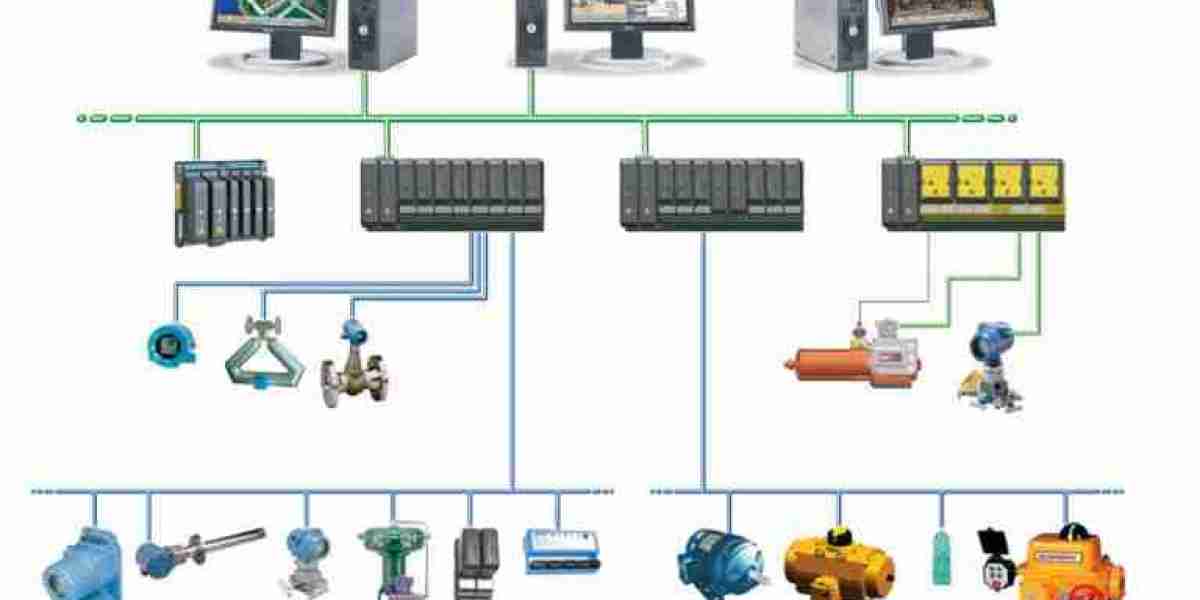Distributed Control Systems (DCS) are integral components in modern automation, facilitating efficient control and monitoring of industrial processes. Widely used in industries such as oil and gas, chemicals, power generation, and water treatment, DCS enables precise control over diverse operations. However, while the growth of the Distributed Control Systems (DCS) market shows promising signs, several challenges persist, which companies must address for continued advancement and adoption in this technology-driven era.
1. Integration Complexity
One of the major challenges for DCS adoption is integration. Many organizations rely on legacy systems that are incompatible with newer technologies. The integration of a DCS into a variety of heterogeneous control systems across industries requires significant investment in time, skills, and resources. The complexity of seamlessly linking DCS with distributed components and ensuring the compatibility of the system with existing operations presents both technical and organizational difficulties. Overcoming this challenge involves detailed planning, bespoke designs, and possible system refurbishments, which can slow down overall project timelines.
2. Cybersecurity Concerns
With the increasing reliance on digital technologies, cybersecurity risks are a growing challenge for distributed control systems. Hackers are continuously targeting industrial control systems (ICS) in efforts to disrupt operations, steal data, or damage equipment. Protecting these critical infrastructures is not just a technical requirement but a vital aspect of industrial resilience. Manufacturers in the DCS market must ensure robust cybersecurity mechanisms such as intrusion detection systems, firewalls, and regular software updates to safeguard against cyber-attacks. In an environment where downtime is highly costly, addressing these vulnerabilities remains an ongoing challenge for the sector.
3. Skilled Workforce Shortage
A skilled workforce is essential for the smooth functioning and maintenance of Distributed Control Systems. However, there is a noticeable shortage of qualified professionals well-versed in DCS technologies and industrial automation processes. Educational institutions and technical programs often fail to provide enough expertise in the niche field of control systems, further exacerbating the talent gap. Organizations have to spend heavily on training current employees or recruiting skilled talent from specialized service providers. As the complexity of industrial automation grows, maintaining a workforce with the right expertise continues to be a significant bottleneck for the DCS market.
4. High Initial Investment
The high upfront cost of implementing a DCS system remains a key challenge for adoption, particularly for small and mid-sized businesses. The purchasing, installing, and integrating of these control systems often entail expensive hardware, software, and infrastructure upgrades. Additionally, DCS systems frequently require costly support and maintenance services, posing challenges for companies operating on tight budgets. Financial barriers are a particular issue for emerging markets where resources for technological investment are constrained, affecting market growth in those regions.
5. Upgrading and Expanding Legacy Systems
Another persistent challenge is the upgrading or expansion of legacy systems to meet modern demands. Many companies still operate older DCS systems that cannot fully support the increasing complexity of operations or emerging technological requirements. While there is pressure to adopt advanced digital solutions like Artificial Intelligence and the Internet of Things (IoT) in DCS, replacing outdated systems comes with logistical and financial obstacles. Retrofitting older systems for modern capabilities is often seen as a daunting and expensive task. Organizations must carefully plan their modernization processes to avoid operational downtime and mitigate implementation risks.
6. Standardization and Compliance
As the DCS market grows, a lack of industry-wide standardization remains a hurdle. Without consistent regulations and compliance guidelines across countries, manufacturers face difficulties in designing universal solutions or achieving interoperability. Each sector, and even different regions, might have specific regulatory compliance criteria that developers need to accommodate. Additionally, moving toward more open-architecture solutions poses challenges in the context of compliance, privacy, and security issues, demanding greater regulatory cooperation.
7. Maintenance and Reliability
Ensuring reliability and minimizing downtime for DCS systems, which are integral to mission-critical operations, is an ongoing challenge. DCS systems, once implemented, must be continuously monitored, maintained, and sometimes recalibrated. Given the complex, interconnected nature of these systems, identifying and troubleshooting problems can be difficult, time-consuming, and expensive. Furthermore, predictive maintenance solutions are still being refined, and there are challenges in utilizing them optimally. Maintenance costs, especially for large installations or remote facilities, can overwhelm many organizations.
Conclusion
While the Distributed Control Systems market promises significant growth opportunities in industrial automation, challenges related to integration complexity, cybersecurity, skilled labor shortage, high initial costs, legacy system upgrades, standardization, and ongoing system maintenance must be overcome. As industries push for greater operational efficiency and flexibility, they will rely on improvements in technology and strategic adaptations to continue to realize the full potential of DCS.
By addressing these critical growth challenges and investing in innovation and expertise, companies in the DCS market can pave the way for a more connected and robust industrial future. However, close attention to emerging issues—particularly cybersecurity and talent shortages—is essential for achieving sustainable growth.




